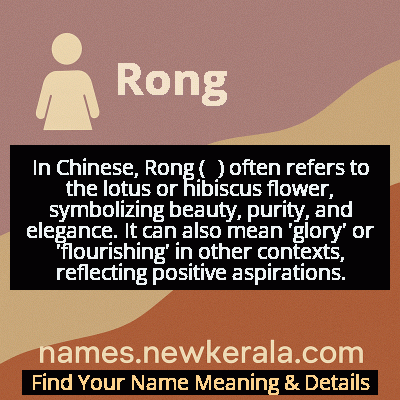Rong Name Meaning & Details
Origin, Popularity, Numerology Analysis & Name Meaning of Rong
Discover the origin, meaning, and cultural significance of the name RONG. Delve into its historical roots and explore the lasting impact it has had on communities and traditions.
Name
Rong
Gender
Female
Origin
Chinese
Lucky Number
9
Meaning of the Name - Rong
In Chinese, Rong (蓉) often refers to the lotus or hibiscus flower, symbolizing beauty, purity, and elegance. It can also mean 'glory' or 'flourishing' in other contexts, reflecting positive aspirations.
Rong - Complete Numerology Analysis
Your Numerology Number
Based on Pythagorean Numerology System
Ruling Planet
Mars
Positive Nature
Generous, passionate, energetic, and humanitarian.
Negative Traits
Impulsive, impatient, moody, and can be overly emotional.
Lucky Colours
Red, maroon, scarlet.
Lucky Days
Tuesday.
Lucky Stones
Red coral, garnet.
Harmony Numbers
1, 2, 3, 6.
Best Suited Professions
Military, sports, philanthropy, leadership roles.
What People Like About You
Courage, energy, leadership, generosity.
Famous People Named Rong
Rong Yiren
Businessman and Politician
Known as the 'Red Capitalist,' served as Vice President of China and founded China International Trust and Investment Corporation
Rong Hong
Educator and Diplomat
First Chinese student to graduate from an American university (Yale), pioneer of Chinese educational reform
Rong Guotuan
Table Tennis Player
China's first world champion in any sport, winning the men's singles at the 1959 World Table Tennis Championships
Rong Zi
Poet
Award-winning modern Chinese poet known for lyrical works exploring feminine identity and nature
Name Variations & International Equivalents
Click on blue names to explore their detailed meanings. Gray names with will be available soon.
Cultural & Historical Significance
The cultural importance of Rong extends beyond mere botanical reference to encompass broader philosophical concepts. In Chinese poetry, the lotus often symbolizes the ideal scholar-official - someone who remains uncorrupted by worldly temptations while serving in government. For women specifically, the name Rong carried expectations of cultivated elegance, inner strength, and moral virtue. The lotus imagery also connects to Buddhist teachings about enlightenment, where the flower represents the awakening of consciousness amid the suffering of earthly existence. This multi-layered symbolism made Rong a name chosen by families aspiring to instill these values in their daughters, particularly during periods of cultural renaissance when classical ideals were being revived and reinterpreted.
Extended Personality Analysis
Women named Rong are typically perceived as embodying the quintessential characteristics of their floral namesake - they display remarkable resilience combined with understated elegance. Like the lotus that thrives in challenging conditions, Rongs often demonstrate an incredible capacity to maintain composure and grace during difficult circumstances. They tend to be deeply introspective individuals with strong emotional intelligence, capable of understanding complex situations without becoming overwhelmed by them. This psychological depth often makes them excellent confidantes and advisors, though they may maintain a certain reserve that adds to their mysterious appeal.
Their personality often blends traditional virtues with modern adaptability, making them equally comfortable in conservative environments and progressive settings. Rongs typically possess a quiet confidence that doesn't need external validation, reflecting the lotus's independent beauty. They often have strong aesthetic sensibilities and may excel in creative fields where their appreciation for beauty can find expression. While generally calm and composed, they can be surprisingly determined when pursuing goals that align with their values. Their combination of inner strength and outward grace makes them natural leaders who inspire through example rather than authority. Many people find Rongs to have a calming presence that brings harmony to group dynamics, much like the lotus brings beauty to its surroundings.
Modern Usage & Popularity
In contemporary naming practices, Rong maintains its traditional appeal while adapting to modern sensibilities. The name continues to be popular among Chinese families, particularly those with strong cultural awareness or artistic inclinations. According to recent demographic data from China's Ministry of Public Security, Rong consistently ranks within the top 200 female names, with notable concentration in urban centers like Beijing, Shanghai, and Guangzhou where educated families often choose names with classical references. The name has experienced a mild resurgence among millennials and Gen Z parents who appreciate its environmental connotations and connection to natural beauty. Interestingly, Rong has also gained some international recognition through Chinese diaspora communities and cross-cultural adoption, where its simple pronunciation and profound meaning make it accessible to non-Chinese speakers. In professional contexts, women named Rong often find the name conveys sophistication and cultural depth, which can be advantageous in fields like international relations, arts, and education. The name's enduring popularity reflects a continuing appreciation for traditional values in modern Chinese society while adapting to contemporary global contexts.
Symbolic & Spiritual Meanings
The symbolic meaning of Rong encompasses rich layers of cultural and philosophical significance that extend well beyond its literal translation. As a representation of the lotus flower, Rong symbolizes the journey from darkness to light, from ignorance to enlightenment - a central concept in Buddhist philosophy. The lotus grows from the mud at the bottom of ponds, rising through murky waters to bloom immaculately on the surface, making it a powerful metaphor for human potential and spiritual transformation. This symbolism suggests that individuals named Rong are expected to demonstrate the ability to overcome challenging circumstances while maintaining their integrity and beauty. In Chinese marital symbolism, paired lotuses represent harmonious union and mutual growth between partners. The gradual unfolding of lotus petals mirrors the development of human consciousness and personal revelation throughout life's journey. Additionally, the lotus's connection to both water and earth positions it as a bridge between different elements, symbolizing balance and adaptability. For women specifically, the lotus has historically represented feminine beauty, purity, and creative power, making Rong a name that carries expectations of grace, resilience, and spiritual depth across all stages of life.

